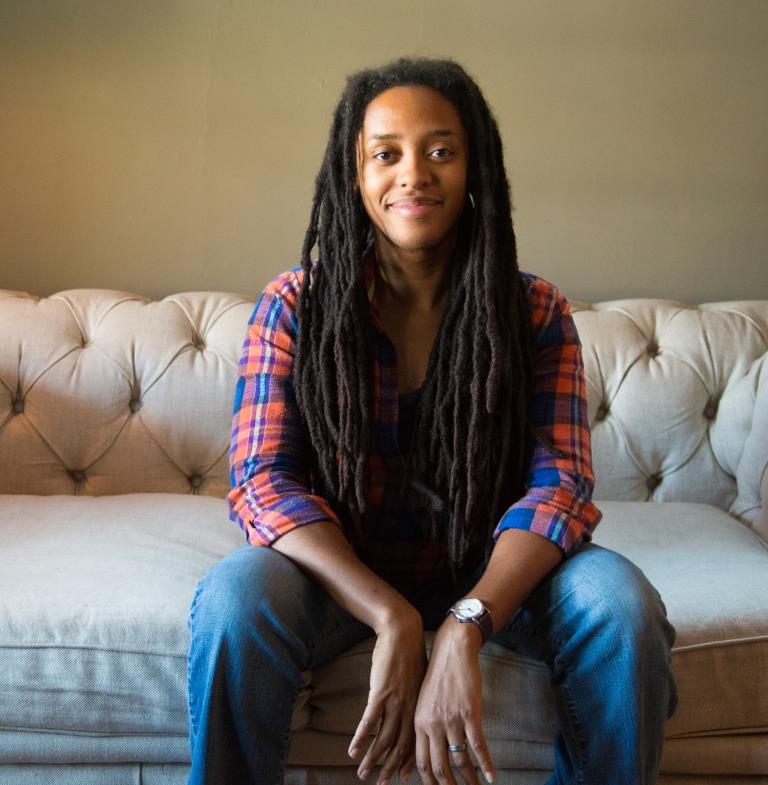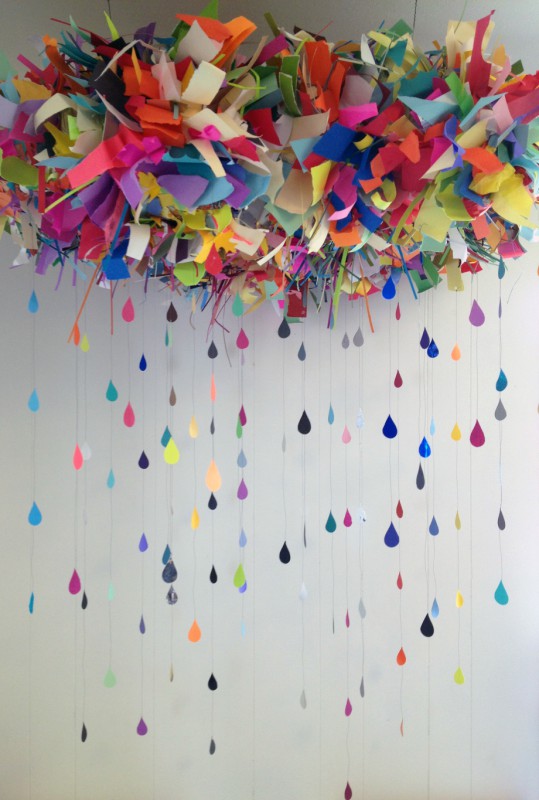In Practice: Writer and Editor Anitra Budd
Lightsey Darst chats with Anitra Budd about colors, cash, work and leisure, and the tension between editorial taste and trends.

Anitra Budd is a freelance editor and writer; she is also a former editor-at-large for Coffee House Press.
How do you spot a promising young writer?
Anitra Budd
I look for evidence of care. I get interested when I see that an author has spent a lot of deep time and energy working through their writing, whether that’s in terms of structure, style, ideas, characterizations, or some other element. Care and attention always show through.
What is work?
Anitra Budd
Work is the opposite of leisure. Work has expectations and parameters (how much it’ll pay, when and how often it’s expected to be completed, where it’s conducted, etc.). To me leisure is all about the lack of expectation, which is what can make it terrifying.
What is a shameful waste of time?
Anitra Budd
I’d define a “shameful” waste of time as being one that has absolutely no return on investment. And I think that even the most seemingly pointless activities (like, ahem, binge watching old episodes of A Different World, which I’m currently doing in my downtime) can still have a lot of value. So, I would say a “shameful waste of time” would be being malicious or cruel. To me, it’s one thing to be angry, because anger can be a hugely productive emotion. But I think the purposeful inflicting of pain, hurt, negativity, whatever you want to call it, doesn’t produce anything.
Lightsey Darst
There’s something going on between the above two answers, isn’t there? You have leisure, defined as a void, and then you have “seemingly pointless activities,” which return you something (even if perhaps you don’t know what that is). This strikes me as a truth of modern urban intellectual life—that we are always doing work. Binging, after all, is effortful. Leisure, on the other hand—what is that? I picture a very rich and beautiful person relaxing by a pool. Is leisure for “us” (people who have to work for a living)? Can we claim it?
Anitra Budd
I’d like to think so, but I’m not entirely convinced it’s possible. I read an article in The Economist a while back (this one) which talks about how the very concept of a leisure class (that rich person relaxing poolside) is getting flipped on its head. Apparently, these days, the more affluent and educated you are, the more hours you tend to work. Sociologists and economists propose several reasons for this turnaround, one of which is changing social mores. There’s a real stigma around not working, as anyone who’s ever been out of a job can probably attest. You can even see some of this in depictions of retirement. If financial planning advertisements are any indication, we’re supposedly meant to spend our retirements volunteering, gardening, traveling all over, starting businesses, going back to school, and so on—all of which might be enjoyable, but they’re not exactly leisurely activities, are they? Maybe the question isn’t so much about whether people who work for a living can claim leisure, but whether anyone can. Or, put another way, is there such a thing as modern-day leisure?
Thinking about all of this is making me desperate for a nap!
Looks, money, race, class, gender/sexual identity: Pick one and describe its impact on your life.
Anitra Budd
In my family, we talk about money on a daily basis, which I’ve come to realize over the years isn’t necessarily typical for a lot of households. Some of these conversations are big (like talking about the ramifications of buying a new house), but a lot of them are very mundane (planning meals that fit the weekly grocery budget, figuring out how much we’re going to spend on Christmas presents for our kids, that sort of thing). Thinking about money so frequently and so matter-of-factly has made me more aware of just how much it affects the other elements on your list—looks, race, class, gender/sexuality. How much it affects and interacts with them, I should say. Money can act as a sort of universal password: if you have enough of it, a lot of avenues and opportunities will open themselves to you regardless of looks, race, etc.
Lightsey Darst
So interesting. In my (white, middle-class, middle income) family, we absolutely did not talk about race, class, or money. We didn’t talk about politics either; I didn’t know who my parents voted for until I was at least ten. Sexual orientation did not exist any more than class did. We did, however, talk about looks—and smarts, which I didn’t put on the list. Looks, smarts, style. It’s interesting what a family chooses to focus on. Did you choose to bring money into your household conversations? Was that a deliberate parenting thought—“let’s not hide this, let’s give our kids these tools”?
Anitra Budd
Oh yes, it was a very intentional choice. For us, being able to manage money isn’t just some arcane, occasionally handy skill. It’s vital. I shudder to think of how much trouble our kids might get into if we were to shy away from being open with them about spending, saving, etc. Case in point: When I was in college, there was an on-campus event during the first couple of weeks of the fall semester one year, a sort of “welcome back” thing. All kinds of businesses were there, including several credit card companies. You’d apply for a card and get a water bottle or a t-shirt or some other little freebie. They made it so easy to make a really high-stakes decision, one that could have huge consequences later on for getting a car, buying a house, all sorts of things. Getting into debt, especially “bad,” high-interest debt, can even determine the kinds of jobs you have, the entire trajectory of your career. Do people feel as free to be artists or entrepreneurs or nonprofit professionals if they’re saddled with tons of debt when they’re young, or do they feel obligated to take the best-paying job they can find no matter what?
Now, obviously, we can’t make our kids’ future decisions for them; we can’t force them to spend less than they earn, or keep them from maxing out credit cards. But I don’t ever want them to make bad choices just because we held back information. They’re both girls, so it’s already highly likely that they’re going to earn less over their lifetimes than men with the same jobs. To me, the least we can do as parents is make sure they’re armed with enough knowledge to manage the money they do earn well.

Current color obsession?
Anitra Budd
I don’t know why, but this might be the hardest question to answer! I have two small children, so I’ve gotten used to talking about “favorite” colors—each person in our family has a favorite color, and I know the favorite colors of each of my daughters’ friends. It’s a sort of canon. Not only that, but the color almost becomes shorthand for the person. So to think of a “current” color obsession seems weird—I’m purple, end of story. But on the other hand, I have been noticing yellow, orange, white, and gray a lot more recently. For some reason, those colors—in clothes, houses, pictures, etc.—have been standing out to me more than usual.
Lightsey Darst
I’m purple, too! I got called out on that once by one of my students, and I was so embarrassed, because somehow for an adult to have a favorite color—unless you are in regular contact with children, as you describe—is immature. But the fact remains that I am purple, and I love that way of putting it—you and the color identified. Now, I wonder, how did you become purple? Did you have to fight for purple? Was that your favorite color when you were a kid?
Anitra Budd
It was! And I know exactly what you mean about being an adult with a favorite color. It’s like, if you’re an adult and you’re not an artist or a designer you’re only allowed to enjoy colors in the “right” sort of way. You can say something like, “Oh, I wanted a bright kitchen so I chose this color palette at the paint store.” But saying a color is your “favorite” puts it in this childlike realm, as if admitting a strong preference is somehow unsophisticated. The funny thing I’ve found is that when you call your favorite color your “signature” color, or something similar, it completely dispels that childish connotation. Funny how words work.
Lightsey Darst
Regarding the yellow, orange, white, and gray—you and I are Pinterest friends, and I also see these colors rippling across my screen, particularly for interiors. There’s even a particular trend of one or two violet objects in a predominantly yellow-orange-white-gray interior—so maybe these colors are calling to you as adjuncts to your color?
Anitra Budd
You know, now that you mention it, I have been thinking a lot about “joining” colors, and how to find color schemes that lots of people can relate to. My family lives in a duplex with a couple who’s very close to us (they’re our girls’ godfathers, in fact). So, when we think of the house and the yard, and how we want them to work and look, we’re talking about issues that affect lots of different people with different aesthetics. For example, how do we choose colors that are still fun for the girls but don’t make the adults want to cover their eyes? How do we marry the more modern, industrial look a couple of us like with the more ornate pieces others love? It’s one thing to have favorites and preferences, but when you live with other people you can’t let any one point of view crowd out the others (not if you want household harmony, anyway!).
Lightsey Darst
This whole color discussion is making me think of the relationship/difference between taste and trend. As an editor, you’ve got to be really aware of how those two shape and cloud your reactions to a possible acquisition, right? How do you balance those in your work?
Anitra Budd
You’re right, I do feel this push and pull a lot as an editor. I really value my personal tastes, my idiosyncrasies, but I try hard not to let them get too fixed, or to pretend that they’re somehow intrinsically more valid than another person’s tastes. It’s hard because there’s this insidious power dynamic at play. When you get to exercise your taste (like in acquisitions) and have your tastes congratulated and echoed back at you (like when a book you acquire does well), it’s very seductive. Much more so than trends, I think. Trends have such incredibly short lifecycles now, and there seem to be so many competing for attention at any given time. As a result of all that noise, individual trends are actually pretty easy to ignore. For me it’s the deifying of taste and curation (and by extension tastemakers and curators) that’s much harder to grapple with. The only solution I’ve come up with is to focus on the work itself. After all, the work is what will stand long after my tastes have changed or trends have come and gone. I try to never lose sight of the fact that when I do my work—whether I’m editing, acquiring, or writing—my ultimate goal is to communicate. If I’m doing that to the best of my abilities, and if I’m helping a writer do that to the best of their abilities, then hopefully I’m on the right track.
Editor’s Note: Lightsey Darst is conducting a series of interviews with artists, writers, and other interesting people. Look for repeating questions across the series. If there’s someone you’d like to see her interview, please let her know: lightsey(at)lightseydarst(dot)com.
Lightsey Darst is a writer, critic, and teacher based in Durham, NC.